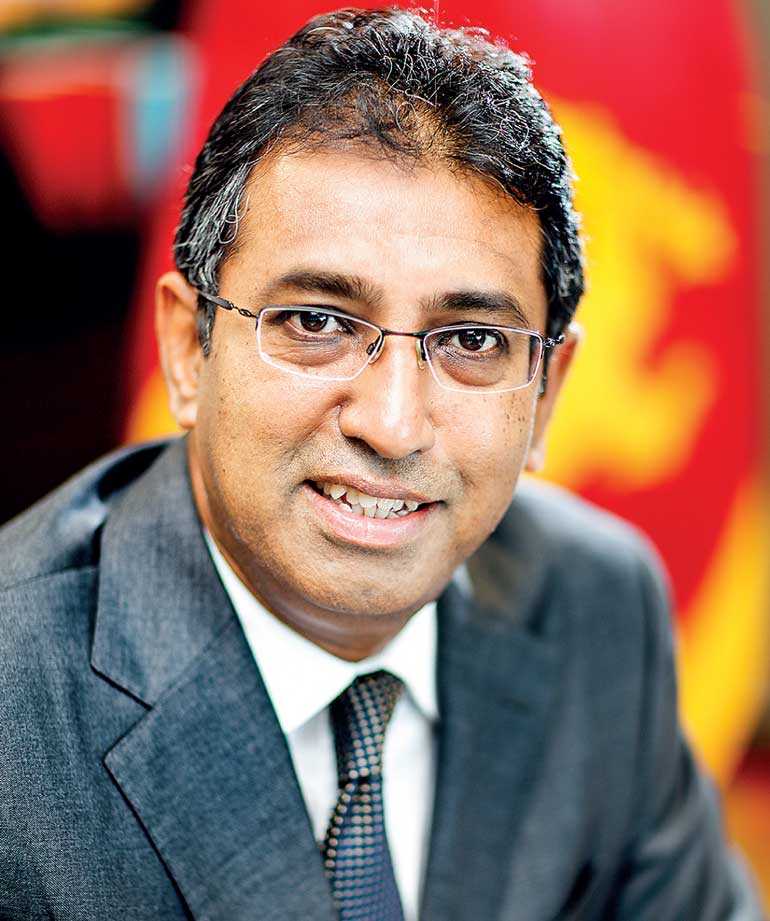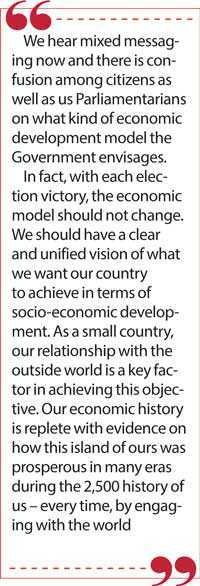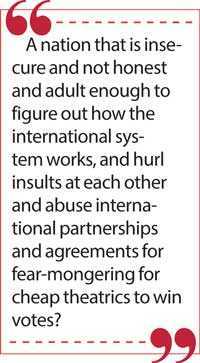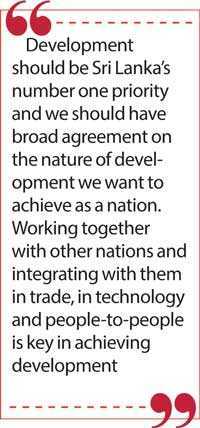Saturday Feb 28, 2026
Saturday Feb 28, 2026
Wednesday, 28 October 2020 00:10 - - {{hitsCtrl.values.hits}}

SJB MP Dr. Harsha de Silva
Main Opposition Samagi Jana Balawegaya (SJB) MP Dr. Harsha de Silva recently in Parliament urged the Government not to build a wall around Sri Lanka, instead build bridges to connect the country with the rest of the world.
He made this appeal as well as highlighted a host of issues concerning Sri Lanka’s foreign relations especially with the US including the then President Mahinda Rajapaksa’s request for US MCC during the adjournment debate in Parliament on ‘International Agreements’. Here are excerpts of Dr. de Silva’s speech in Parliament:
I wish to take a broad perspective on today’s Adjournment Motion to establish a foundation for this debate.
It is 72 years since Sri Lanka became an independent nation. And for 72 years, successive governments, including the present one, have pledged to develop Sri Lanka’s economy. Yet, this promise has remained elusive, and still remains elusive. Various explanations are always given. Each new government blames the one before.
In the meantime, countries that lagged behind us at the time of independence, both in the region and beyond, have got ahead in the race of achieving higher levels of socio-economic development for their people. Even after all these years, we have still not been able to achieve consensus on critical policy issues that are necessary to make us a developed nation.
 |
 |
 |
 |
Do we even know what kind of democracy and development we want to achieve? Not even the many cycles of violence that our nation has experienced since 1948 have so far succeeded in making us introspect and unite on basic fundamentals.
Even today, we are at each other on constitutional reforms. Those who won elections in the past vowing to abolish the Executive Presidency are now doing everything possible to increase its potency after agreeing unanimously to reduce the same just five years ago. Even our treasured democratic system of governance in the broadest sense of the term accountable to a well-informed electorate, is under threat.
We hear mixed messaging now and there is confusion among citizens as well as us Parliamentarians on what kind of economic development model the Government envisages.
In fact, with each election victory, the economic model should not change. We should have a clear and unified vision of what we want our country to achieve in terms of socio-economic development. As a small country, our relationship with the outside world is a key factor in achieving this objective. Our economic history is replete with evidence on how this island of ours was prosperous in many eras during the 2,500 history of us – every time, by engaging with the world.
In fact, as one of the most strategically located nations in the current global growth phase led by the littoral states of the Asian Ocean, – people may ask what I mean by that. Here, I mean both the Indian and the Pacific – it is imperative that we, as both Government on that side and Opposition on this side, are on the same page on this important matter.
We should have been in a position to arrive at today’s debate on the Adjournment Motion on international agreements with maturity, with depth into factual costs and benefits of such.
In this day and age of regional production networks where components cross-borders sometime several times before a good is finally produced, international agreements, particularly on trade, are crucial. They could be bilateral or multilateral, but leaders must be able to appreciate the importance of international trade agreements.
It was David Ricardo in his 1817 famous book ‘On the Principles of Political Economy of Taxation’ who explained the concept of ‘comparative advantage’ and how nations can benefit by trade.
Counter-intuitive at the time that trade among nations can benefit a nation even if it has absolute advantage in everything it produces, the concept is about relative advantage of producing different goods in the same country. Even today, to some in this House, this is ‘Portuguese’! Well, pun intended, Mr. Speaker, because David Ricardo was from Portugal.
They believe that nations must attempt to produce as much as possible of everything they can produce in one country, ‘to save foreign currency’. We hear this every time in this Assembly. We must produce everything we can produce in this country because we can save foreign currency. Well, this is irony that it is counter-intuitive, but theoretically you can show, and countries have benefited from trade even though countries have absolute advantage in everything that they produce. We hear argument; “Why do we need to import when we could produce the same locally?” We heard it today multiple times.
It is unfortunate that what Parakramabahu the Great understood in the 12th century and made this nation great, some of us are unable to comprehend even today.
Let us move to the broader sense of international agreements. But, unfortunately, discussing international agreements today is not cast in terms of comparative advantage of mutual benefit, but cast in terms of conspiracy theories.
For instance, that the Singapore Trade Agreement would take away jobs from our people and that Singaporeans will arrive by shiploads to take these jobs. What bunkum! Mr. Speaker? But that is the kind of conspiracy theory falsification that was spread across this nation. That is very unfortunate. Is this the profile of Sri Lanka that we want to project to the outside world?
A nation that is insecure and not honest and adult enough to figure out how the international system works, and hurl insults at each other and abuse international partnerships and agreements for fear-mongering for cheap theatrics to win votes?
As it is now quite widespread, our people are being misled by various false narratives about international treaties and bilateral agreements.
Let me reiterate that all agreements always have a clause regarding withdrawal or termination of an agreement.
Recent conspiracy theories and false narratives against the Millennium Challenge Corporation for instance, that were being advanced by someone that has now been appointed as an Ambassador to a key bilateral partner nation of Sri Lanka concluded that countries cannot withdraw from Agreements once they are signed. That is not true. We constantly see countries withdraw from Agreements. For example, we recently saw even the United States withdraw from the intermediate-Range Nuclear Forces Treaty with Russia.
Although all kinds of files were spoken on TV shows and public platforms, and written about including in mainstream national newspapers, in the lead up to Sri Lanka’s Presidential Election in November 2019 about the Acquisition and Cross-servicing Agreement or ACSA between Sri Lanka and the USA, why has the Government not withdrawn from it, although almost a year has now passed since the Presidential Election? It was vilified. Why have they not withdrawn from it?
I referred earlier to our strategic geographic location. Yes, we are most strategically located.
However, whether we derive maximum benefit from our geographic location and translate it into prosperity for all our citizens depends not on how successfully we manipulate our partners and play or balance one against the other. That is not how we do it, Sir. But on how well we work with all our partners in the international community truthfully, honestly, and sincerely. Sincere and mature partnership is important. Dealing in lies leads to loss of credibility which is extremely difficult to regain as a nation.
Development should be Sri Lanka’s number one priority and we should have broad agreement on the nature of development we want to achieve as a nation. Working together with other nations and integrating with them in trade, in technology and people-to-people is key in achieving development.
When I introduced the ‘1990 Suwasariya’ Ambulance to this country in 2016, I heard all kinds of insults; they told me I was a raw agent, that I was going to bring Indian staff, which was absolutely not true. Today, I am so proud and I along with the 1,500 staff who started it and is being currently very well and most efficiently ruled out by the current Government has been an absolute saviour of lives. So this is just a personal experience that we have to be truthful in what we say about international agreements.
Take the recently much vilified Millennium Challenge Corporation or MCC agreement for instance. It was the current State Minister of Money and Capital Markets who was the champion for the MCC in 2005, Hon. Ajith Nivard Cabraal.
There were multiple times he wrote to the MCC. In fact, I think he was a national focal point. Before Mrs. Dhara Wijayatilake became the national focal point, he became the Governor of the Central Bank. The then Government really wanted to obtain the compact. It did an enormous amount of preparatory work and had multiple meetings and presentations. An entire team worked on it for months and years. In fact, when the then President, the current Prime Minister, found out that the MCC agreement was in technical difficulty, Sir, did you know that he wrote directly to US President George Bush? It was unprecedented, but he did. President Rajapaksa wrote to President Bush asking him, “Please give us the MCC”. I have the letter here. But for cheap politics suddenly the MCC became the most detrimental international agreement ever contemplated when it was subsequently pursued by the previous Government.
Let me come back to the subject. Here, development does not mean only growth and development does not mean how well Sri Lanka’s stock market performs. Development is essentially the structural transformation of the economy – moving away from rural, agrarian, low-skilled, and low-paid to more urban, technology-based, high-skilled and high-paid economy. This means, ensuring that local companies – be it state-owned or privately-owned, have the capability and institutional culture to move up from producing simple products and services towards increasingly complex products and services.
But, confusing signals about repeating past economic experiments failed in the 1970s when the world was, in any case, a different place, makes one wonder whether we want to move back to an agrarian-based economy with import restrictions and adopting a sort of a ‘hermit kingdom model’ with centralised command and control, giving up democracy, individual rights, media freedom, and individual empowerment to recede from the international community.
Yes, the pandemic has slowed down and disrupted the movement of goods and people. However, the reality is that the world has become globalised and it is a far stretch to imagine that the globalised nature of the world will be abandoned. Despite the disruption that has occurred as a result of this pandemic, and protectionist tendencies that one sees, it will not be possible for countries to achieve levels of equitable prosperity and socio-economic development that people would desire by receding from the international stage and shutting down supply chains. The lessons the world has learnt through all this, if at all, are how much our destiny is bound together, how vulnerable we are as a species to pandemics and the effects of climate change which require global solutions that make working together, imperative.
In closing, I would urge the Government to move away from falsifications and conspiracy theories regarding international agreements. Whether it is with the IMF in these difficult times, or with the proposed ECTA with India or the FTA with China or the ACSA or the MCC with the US, please, let us debate facts and benefits that will ultimately help Sri Lanka achieve that elusive development of our country.
I hope the Government will indicate to the people where they stand with relation to these agreements and how they propose to proceed, if at all.
My strong view is that Sri Lanka must not build a wall around our nation, instead we must build bridges from our country to the region and beyond. That is how we could build the national economy and achieve our overall objective of development.